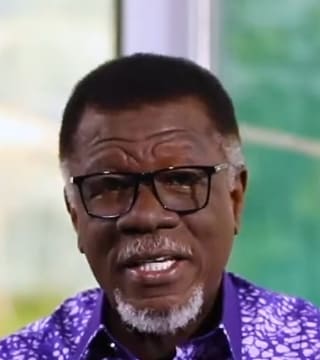Mensa Otabil - The Lord of Mercy (10/07/2025)
We’re still in Psalm 9 and we look at verses 13 and 14. Have mercy on me, O Lord; consider my trouble from those who hate me. You who lift me up from the gates of death, that I may tell of your praise in the gates of the daughter of Zion. I will rejoice in your salvation. You know the Psalms are very rich expressions of prayer, a desire to God; and as you read them, you see the diversity of ways in which we can bring our requests to the Lord and how we can pray. You also see the way in which God relates to us, His covenant people.
So David is the one inspired to pray this prayer; this is an inspired prayer of the Holy Spirit. He calls on the Lord to respond to him in his affliction, and then he asks God to show him mercy. That’s very important because there are two ways in which God can deal with us: He can deal with us according to mercy or according to judgment. When our hearts are right towards Him, then He deals with us according to His mercy. But when we’re wicked and destructive, then His judgment comes upon us.
So David is now relying on God’s mercy, and when we rely on God’s mercy, He extends His kindness to us. Three things I want you to notice about what he calls for when he’s asking for God’s mercy. He says, «Have mercy on me, O Lord; consider my trouble.» Mercy causes God to consider us, to pay attention to us, to notice us. Mercy is like God turning His eyes to look in our direction, to focus on us, so that’s what David is saying: «Lord, turn your eyes upon me. See me, see what I’m going through, see my afflictions, see what people are doing to me.»
It is the mercy of the Lord that enables Him to take notice of us. Of all the billions of people on this planet, God’s mercy directs Him to those in need of Him. So that’s the first thing: God’s mercy enables Him to take notice of us. Secondly, God’s mercy makes Him lift us up, and he says, «Lord, you who lift me up from the gates of death.» The mercy of God is what lifts us up from the gates of death, from the place of destruction. When someone has set you up for destruction, what is going to deliver you is not just your own cunning and your own effort. Yes, it’s good to make an effort and work hard to free yourself from the trap, but David is appealing to God’s mercy.
May the mercy of the Lord be available to you and to me, to all of us, and lift us up from what David calls the gates of hell or the gates of death. David talks a lot about this because he’s expressing the things that people are doing against him with the intention to take him out, to kill him. He calls it the gates of death; he’s almost at the point where the plans of the wicked are succeeding. He calls for God’s mercy, and may the same God of mercy show you mercy and lift you up from the gates of death.
The third thing he says is, «that I may tell of your praise in the gates of the daughter of Zion.» Mercy gives us a testimony. When God shows us mercy, He gives us a song. David says, instead of being buried at the gates of death, I’m going to sing at the gates of the daughter of Zion. I’m going to sing in a good place; I’m going to testify in a good place. I’m going to rejoice in a good place. There is going to be a testimony coming out of this.
So you see what God’s mercy does for us: God’s mercy turns His face toward us; He considers us. God’s mercy lifts us up from the trap that is set for us, and God’s mercy gives us a testimony. I don’t know what you’re going through; I don’t know what life is throwing at you, but by the mercy of God, you will come out with a testimony, and God will give you a song-a song of deliverance, a song of praise. It may be for you; it may be for your children, your husband or your wife, your mother, your grandmother, or a friend in the office, or someone you know. May God show them mercy so that they would come out of wherever they are with a song and a testimony.
Let us pray. Say with me, «Heavenly Father, I receive your mercy in this time of need. Thank you for deliverance, in Jesus' name. Amen and amen.» Well, I’ll catch you again tomorrow. I’m Pastor Mensa Otabil. Shalom, peace, and life to you.

